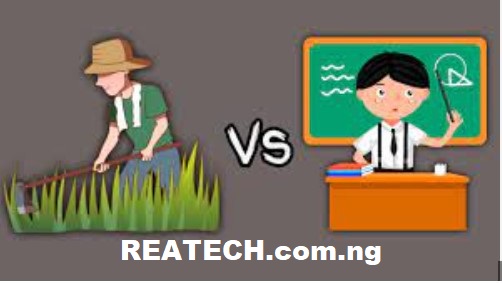
Introduction
This article explores several reasons why teachers might be considered superior to farmers, acknowledging the crucial roles both professions play in society. While farmers produce the food consumed by teachers, the discussion emphasizes the reciprocal nature of their contributions. Farmers provide sustenance, and teachers, in turn, offer knowledge and guidance on crop care and production techniques. The article aims to shed light on why, despite their interdependence, some argue for the superiority of teachers over farmers.
Teacher vs Farmer, Why the Comparison?
While the mentioned points might not immediately suggest a need for comparing teachers and farmers, many people actually think teachers are better than farmers. However, some people disagree and believe farmers are equally important or even more valuable than teachers. The article will explore why some favor teachers, and others have a different opinion.
Although this article supports the motion “Farmers are better than Teachers” there is another well-written article on this website that opposes the motion. You can read about it here.
In this article, you will discover the reasons why some individuals argue in favor of the idea that teachers are superior to farmers, or more crucial than farmers in our society.
Who is a teacher?
A teacher is someone whose main job is to guide and assist students in gaining fundamental knowledge, skills, or virtues. An effective teacher listens to students’ needs, inspires, and motivates them with care, thereby establishing a meaningful learning environment.
Who is a Farmer?
A farmer is an individual engaged in food production and various agricultural activities for both human and animal consumption. Farmers raise livestock such as cattle, sheep, pigs, and chickens for meat or eggs. Additionally, they cultivate fruits, vegetables, and grains to provide food for people.
Why I Support the Motion?
I have many reasons to support the belief that teachers are superior to farmers. Firstly, teachers possess a deeper understanding of how children learn. They are knowledgeable about motivating students and creating a comfortable classroom environment.
Please note that there’s another article that opposed the motion as well. You may also love to read that too. It opposes this motion and supports another motion that says “Farmers are Better than Teachers“. Click here to check it out.
Additionally, teachers possess the ability to adjust their teaching methods to cater to the unique needs of each student. This adaptability ensures that every student receives the most effective instruction possible.
Furthermore, teachers have access to a diverse range of tools in their classrooms, including educational materials, technology tools, and calculators. These resources contribute to guaranteeing that every child has equal opportunities to learn and excel in the classroom.
Lastly, teachers often receive support from their district or school system, allowing them to access the assistance needed for success in their careers. In conclusion, I firmly believe that teachers play a more impactful role in the lives of children compared to farmers.
50 Reasons why Teachers are Better than Farmers
Certainly, here’s a summary of the 50 reasons why some argue that teachers are better than farmers:
- Teachers shape the minds of future generations, while farmers provide food.
- Teachers have a direct impact on society’s development, while farmers have a more indirect impact.
- Teachers are highly educated professionals, whereas farmers may not have the same level of education.
- Teachers possess a wider range of skills and knowledge, including communication and critical thinking.
- Teachers contribute to the growth of a knowledge-based economy, while farmers focus on agriculture.
- Teachers contribute to overall well-being, while farmers primarily contribute to the economy.
- Teachers teach values and ethics, while farmers are responsible for producing food.
- Teachers are more adaptable to change and constantly update their skills.
- Teachers have a broader range of career opportunities compared to agriculture-related careers for farmers.
- Teachers can teach sustainable practices and conservation efforts, impacting the environment.
- Teachers advocate for social justice and equality, having a more direct influence than farmers.
- Teachers impact the health and well-being of individuals through teaching healthy lifestyle habits.
- Teachers inspire creativity and innovation, while farmers may focus on traditional practices.
- Teachers contribute to the economy by teaching entrepreneurship and business skills.
- Teachers interact with a more diverse range of students than farmers who may have limited interactions.
- Teachers have a greater influence on public policy, advocating for education-related issues.
- Teachers promote cultural awareness and understanding, surpassing the influence of farmers.
- Teachers have a more direct impact on personal growth and development, while farmers focus on material production.
- Teachers utilize a diverse range of tools and resources in their classrooms.
- Teachers focus on developing critical thinking skills, while farmers emphasize practical skills.
- Teachers are more involved in community outreach and engagement compared to farmers.
- Teachers can promote social and emotional learning, which farmers may not influence as much.
- Teachers employ diverse teaching methods and strategies, while farmers may rely on traditional methods.
- Teachers have a more direct impact on developing communication skills.
- Teachers promote lifelong learning and education, beyond farmers’ focus on their own production.
- Teachers cover a more diverse range of subject areas than farmers limited to agriculture-related topics.
- Teachers contribute to the development of leadership skills more than farmers.
- Teachers operate in a diverse range of learning environments, including classrooms and online platforms.
- Teachers contribute to the development of teamwork and collaboration skills more than farmers.
- Teachers use a more diverse range of assessment methods, while farmers may focus on production output.
- Teachers emphasize problem-solving skills, whereas farmers may focus on practical solutions.
- Teachers have diverse professional development opportunities, including conferences and workshops.
- Teachers contribute to the development of research skills more than farmers.
- Teachers have a more diverse range of career paths beyond education administration and policy-making roles.
- Teachers play a significant role in developing critical reflection skills compared to farmers.
- Teachers utilize diverse teaching styles, including lecture-based and project-based approaches.
- Teachers contribute more to the development of creativity and innovation skills than farmers.
- Teachers address a more diverse range of student needs and abilities than farmers limited to production output.
- Teachers have a greater impact on developing cultural awareness and understanding.
- Teachers use a more diverse range of teaching materials and resources.
- Teachers contribute more to the development of emotional intelligence skills.
- Teachers operate in a diverse range of teaching environments, including outdoor and experiential learning.
- Teachers contribute more to the development of social skills.
- Teachers have diverse teaching goals, including academic and personal growth outcomes.
- Teachers contribute more to the development of empathy and compassion skills.
- Teachers use a more diverse range of teaching approaches, including differentiated instruction and personalized learning.
- Teachers play a greater role in developing self-awareness and self-reflection skills.
- Teachers adhere to a more diverse range of teaching philosophies and theories.
- Teachers contribute more to developing citizenship and civic engagement skills.
- Teachers have a greater impact on the development of global awareness and understanding compared to farmers focused on local production.
Key areas where some argue that teachers are more important than farmers
Certainly, here’s a summary of key areas where some argue that teachers are more important than farmers:
- Educational Impact:
- Teachers directly shape the minds and futures of young individuals, imparting knowledge, skills, and values crucial for society.
- Farmers primarily focus on agricultural production.
- Intellectual Stimulation:
- Teaching requires continuous learning, providing intellectual stimulation for teachers’ personal and professional growth.
- Farmers require knowledge but may not have the same level of intellectual stimulation.
- Versatility:
- Teachers possess a wide range of skills, adapting to various teaching methods, learning styles, and student needs.
- Farmers, while skilled, may not require the same level of adaptability.
- Social Impact:
- Teachers contribute to social cohesion, fostering inclusivity, empathy, and understanding among students.
- Farmers play a vital role in providing food but may not have as direct a social impact.
- Lifelong Learning:
- Teachers emphasize lifelong learning, seeking ongoing professional development opportunities.
- Farmers may not emphasize ongoing professional development to the same extent.
- Critical Thinking:
- Teachers cultivate critical thinking skills in students, essential for societal progress.
- Farmers use critical thinking in agriculture but may not extend it to the same societal impact.
- Creativity:
- Teachers think creatively to engage students, designing innovative teaching methods and lessons.
- Farmers are creative but may not require the same level of creativity in day-to-day work.
- Communication Skills:
- Teachers excel in communication, conveying complex ideas effectively to students with varying abilities.
- Farmers possess communication skills but may not require the same versatility.
- Mentorship:
- Teachers serve as mentors, guiding students emotionally and academically.
- Farmers are respected but may not have the same level of mentorship responsibilities.
- Classroom Management:
- Teachers are skilled in managing classrooms for a productive and safe learning environment.
- Farmers manage farms but may not require the same level of classroom management skills.
- Technological Integration:
- Teachers incorporate technology into teaching, enhancing student learning.
- Farmers adopt technology but may not require the same level of integration.
- Curriculum Development:
- Teachers are involved in designing and developing curriculum materials.
- Farmers adapt to changing practices but may not have the same involvement in curriculum development.
- Flexibility:
- Teachers need flexibility to adapt to changing educational needs.
- Farmers require flexibility but may not need the same level of adaptability.
- Continuous Assessment:
- Teachers constantly assess student progress for effective learning outcomes.
- Farmers monitor crops but may not require the same level of continuous assessment.
- Emotional Intelligence:
- Teachers possess high emotional intelligence, creating a supportive environment.
- Farmers demonstrate emotional intelligence but may not require the same emphasis.
- Advocacy:
- Teachers advocate for students’ rights and needs.
- Farmers advocate for policies but may not have the same level of individual advocacy.
- Global Perspective:
- Teachers expose students to diverse cultures and global issues, promoting global citizenship.
- Farmers contribute to the global food supply but may not impact global perspectives as directly.
- Research Skills:
- Teachers develop research skills in students.
- Farmers may conduct research related to agriculture but may not extend to the same level.
- Professional Community:
- Teachers collaborate in professional communities, fostering continuous improvement.
- Farmers are part of a community but may not have the same level of professional collaboration.
- Job Satisfaction:
- Teachers find fulfillment in students’ growth, success, and positive impact on society.
- Farmers may find satisfaction but may not have the same direct impact on individuals’ lives.
Teachers play a unique and essential role in society, contributing to the intellectual, social, and emotional development of individuals. While farmers provide a vital service by ensuring food security, the multifaceted nature of teaching and its impact on individuals and communities make teachers stand out as exceptional professionals.
Other Key Areas Where Teachers Are Better Than Farmers
Certainly, here’s a summary of the key areas where some argue that a teacher’s impact on humanity is greater than that of a farmer:
- Skills Acquisition and Empowerment:
- Teachers are crucial in imparting knowledge and basic skills, enabling individuals to become resourceful and empowered.
- Socialization:
- Teachers play a vital role in socialization by imparting basic communication skills and societal moral requirements, fostering appreciation for conversational skills.
- Technology:
- Teachers contribute to the impact of modern technology by equipping students with technological skills and expertise, influencing the ease and pleasantness of daily lives.
- Importance in Community Development:
- Both teachers and farmers contribute significantly to society. Farmers provide essential food, while teachers shape future generations and create a well-informed community.
- Intellectual Depth:
- Teaching demands extra care and attention to intellectual depth, engaging diverse students with various learning methods, while farming can be learned through experience.
- Flexibility:
- Teachers must be flexible in their methods to reach a variety of students, while farming faces limitations based on seasons, weather, and soil type.
- Earning Potential:
- Both professions offer different earning potentials. Farming may have unpredictable returns, while a teacher’s earning potential is often more stable and predictable, providing greater financial security.
- Personal Satisfaction:
- Job satisfaction is subjective, with farmers finding pleasure in successful crops, and teachers deriving satisfaction from relationships and helping children learn.
More Reasons to Advocate for Teachers
- Daily Tasks:
- Teachers engage in daily tasks such as preparing lessons, grading tests, calculating grades, scoring student performance, coaching in competitions, and meeting with parents for feedback.
- Administrative Duties:
- Teachers have administrative duties such as writing reports, letters, and correcting student errors and poor attitudes.
- Continuous Learning:
- Teachers need to continue studying for updates and stay concerned with evaluations and school schedules in preparation for prospective practices and class stage appearances.
- Class Preparations and Management:
- Teachers are concerned with 7 to 10 class preparations, classroom management, and additional workload imposed by superiors.
- Evaluation and Advancement:
- Teachers are concerned about being judged for advancement.
- Farming Comparisons:
- Farming is portrayed as less taxing, with the ability to delegate work and get enough rest. Farmers are only occupied during planting and harvesting times.
- Technology and Equipment:
- Contemporary technology and equipment are mentioned as making a farmer’s life easier.
- Happiness and Income:
- A farmer’s happiness is linked to crop yield, and effective marketing can lead to significant income.
The overall perspective is that the demands on teachers, including academic, administrative, and personal aspects, make their profession more challenging compared to farming, which is depicted as less demanding, especially with modern technology and delegation of tasks.
In Conclusion:
Absolutely, the comparison between teachers and farmers involves subjective perspectives and is influenced by individual perceptions. Instead of pitting one profession against the other, it’s important to recognize and appreciate the unique skills, dedication, and passion that each profession contributes to society. Both teachers and farmers play crucial roles, and their respective contributions are valuable for the well-being and functioning of our communities. Appreciating the diversity of skills and recognizing the importance of each profession fosters a more inclusive understanding of the roles people play in our society.




